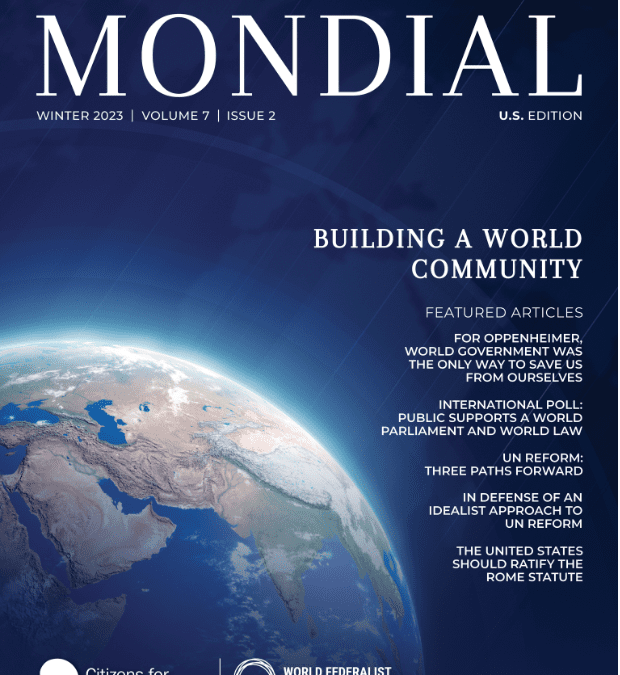

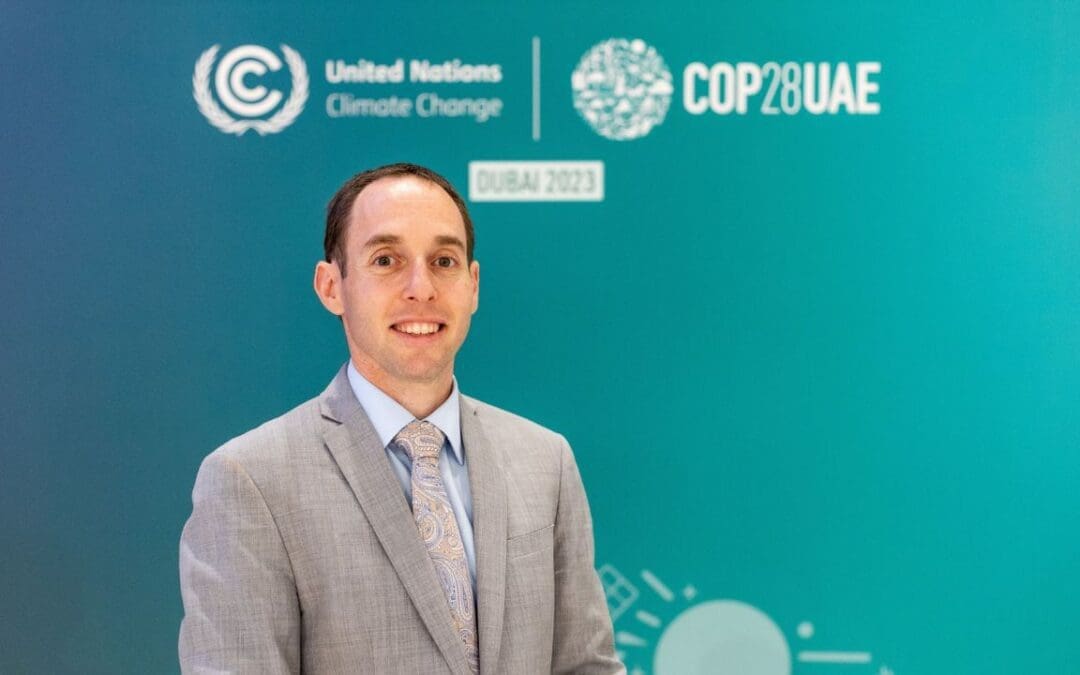
Climate Change, the SDGs, and My Father
My father was always the smartest person in the room. Despite never studying medicine, he once assisted a pre-med friend in preparing for an exam entirely by recalling intricate anatomical structures from a biology course he had taken thirty years prior.
My father was also a smoker. Some of my earliest memories are my tearful pleas to him to stop, knowing, as we both did, the risks. My dad did the math and determined that he didn’t yet need to change behavior. He would coin clever phrases like “maybe I might” and “I want to want to quit.” This reticence instilled in me, from a very young age, a curiosity about what truly motivates people to change. Is it data? We had that. Is it the cries of children? We had that, too.
As I awoke earlier this week to the news that agreement had been reached in Dubai, I, like many, chose to see hope in this small step. I will work tirelessly to contribute my small portion to this great collective effort to stave off the worst consequences of climate change. Yet a question remains in my mind—to what degree can these agreements bend the curve of our behavior? How can we ensure the trajectory will be meaningfully different with this consensus having been reached?
I look to examples the international community has created to shape the behavior of governments and humanity more broadly. The Security Council, the human rights system, the sustainable development goals. Each has had an impact in its own way. A stronger enforcement mechanism like the Security Council increases legitimacy, but limits consensus. A systematic and mandatory review system, like the Universal Periodic Review, ensures oversight and greater fact-finding, but is dependent on Member State compliance for results. And an entirely voluntary system, like the Sustainable Development Goals, can inspire the masses and allow the tracking of progress. Yet for the SDGs, and based on recent reports, the curve has yet to be bent sufficiently to achieve the prosperity a bright-eyed 2015 international community hoped for.
These are all helpful in their own right. But the forces of inertia are strong. Volition and motivation are needed.
Nowhere is this more relevant than in the case of climate agreements. Many nations which have contributed the least to climate change must respond to consequences not of their making. And those which exercise an outsized influence on the shape and direction of human affairs, for reasons of history and current priorities, are being asked to sacrifice a degree of short-term well-being of their economies for the long-term security of themselves and others. The science is clear; the issue is summoning the will to overcome the uncomfortable to achieve the necessary. In a way, these countries are my brilliant father.
When my dad was diagnosed with pancreatic cancer—the risk of which was increased by his smoking habit—he quit immediately. It was remarkable. But it was too late. He might have gotten cancer anyway, and it isn’t fair to place blame not knowing the alternate reality. But he certainly did not follow the rules of the precautionary principle in his behavior.
I am heartened to know that in communities around the world, action is being taken now to improve humanity’s relationship with the natural world. People are not waiting. Agreements like those reached in Dubai, in Paris, and elsewhere are important. They represent the consensus of governments, and we, as well-wishers of humanity and the planet, should encourage and expect ever higher ambition.
Yet regardless of our opinion of the outcome in 2023, we have a responsibility to continue looking for the stores of motivation and the diversity of options for individuals, institutions, and communities to make the necessary changes in light of the mounting evidence. If any lesson is to be taken from my family, it is that waiting is not a viable option.
This article was originally published in Bahá’í International Community’s blog.
Photo credit: Baha’i International Community
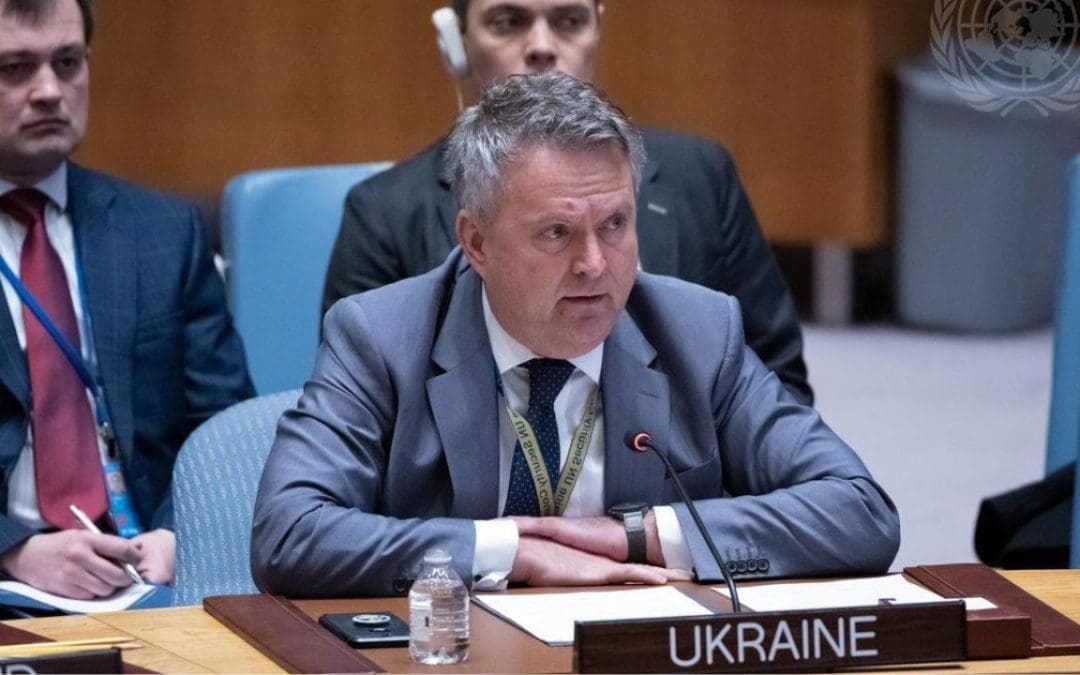
Replacing a Disastrous War with a Just Peace in Ukraine
Although the unfolding humanitarian catastrophe in Gaza has captured the world’s horrified attention, the war in Ukraine has had even more terrible consequences. Grinding on for nearly two years, Russia’s massive military invasion of that country has taken hundreds of thousands of lives, created millions of refugees, wrecked Ukraine’s civilian infrastructure and economy, and consumed enormous financial resources from nations around the world.
And yet, despite the Ukraine War’s vast human and economic costs, there is no sign that it is abating. Russia and Ukraine are now bogged down in very bloody military stalemate, with about a fifth of Ukraine’s land occupied and annexed by Russia.
Meanwhile, polls show that an overwhelming majority of Ukrainians remain determined to continue the struggle to free all of Ukraine from Russian captivity. Indeed, an opinion survey in the fall of 2023 found that 80 percent of Ukrainians polled believed that under no circumstances should Ukraine give up any of its territory.
Similarly, in Russia, polls have found that a majority of the public appears content with the Putin regime’s military conquest of Ukraine and is opposed to any peace settlement that would relinquish Russian control of conquered Ukrainian land. Of course, the accuracy of Russian polls on the Ukraine War remains deeply suspect, for professing opposition to the war could easily lead to arrest, as it did for 20,000 Russians in 2022. Perhaps for this reason, numerous Russians polled refused to answer the question of where they stood on the war. One participant responded: “Thank you for the opportunity not to testify against myself.” In any case, in increasingly authoritarian Russia, public sentiment against war seems unlikely to alter the Putin administration’s determination to triumph on the battlefield.
Admittedly, in the United States, the major supplier of military and economic aid to beleaguered Ukraine, some developments point to declining enthusiasm for that role. The Republican Party has revived its 1930s policy (once termed “isolationism”) of appeasing military aggression by rightwing dictatorships, while leftists with an anti-American slant see a Russian victory as a useful way of somehow destroying “U.S. imperialism.” Nonetheless, unless Donald Trump and his MAGA followers sweep into power in 2024, it seems unlikely that the U.S. government or its NATO partners will entirely abandon Ukraine to a future under the jackboot of Russian military occupation.
Given these obstacles, is there a way to secure a just settlement of the Ukraine War?
There is, but it will take some creative action by the United Nations, the global organization that has been authorized to enforce international security.
Since the beginning of the Russian invasion of Ukraine on February 24, 2022, the overwhelming majority of the world’s nations have repeatedly used their participation in the UN General Assembly to condemn the Russian invasion and to call for a just peace in Ukraine. For example, on the eve of the one-year anniversary of the war, the General Assembly, by a vote of 141 nations to 7 (with 32 abstentions), demanded that Russia “immediately, completely, and unconditionally” withdraw its military forces from Ukraine and called for a “cessation in hostilities” and a “comprehensive, just and lasting peace” based on the principles enshrined in the UN Charter. The UN Charter, of course, constitutes international law and bans “the threat or use of force against the territorial integrity or political independence of any State.”
Even so, it is the UN Security Council that is tasked with enforcing international security, and Russia has used its veto in that UN entity to block UN action to end the Ukraine War.
The paralysis of the UN Security Council, however, need not continue. As Louise Blais, Canada’s ambassador to the United Nations from 2017 to 2021, has recently pointed out, Article 27 (3) of the UN Charter states that a party to a dispute before the Security Council shall abstain from voting in connection with the dispute. But, when it came to the Security Council’s votes on the Ukraine War, as Blais noted, “none of the 10 elected Security Council members had the courage, vision or backing to put forward a resolution” demanding abstention. According to Blais, the unwillingness of the four other veto-wielding members (Britain China, France, and the United States) to avoid a crippling Russian veto and, thereby, empower the Security Council to act, reflected their “zero interest in supporting such a move for fear it would limit their own power in the future.”
But there is ample precedent for limiting the veto in this fashion. The United Nations has a history of veto-wielding nations abstaining from Security Council voting when they are parties to a dispute. As Blais observes, between 1946 and 1952, Security Council members “regularly adhered to the obligatory abstention rule.” Only in later years did the five permanent Security Council members curtail the application of this practice.
In short, based on both international law and precedent, the UN Security Council has the authority to impose a settlement of the disastrous Ukraine War. What kinds of international action this would require would need to be determined by the world organization, just as the final terms of a peace agreement would ultimately need to be accepted by the contending parties. But, given the overwhelming support in the UN General Assembly for the withdrawal of Russian military forces from Ukraine and for a lasting peace agreement, such a peace settlement is likely to be a just one.
At the least, this would be a far better method of dealing with international conflict than the current full-scale war currently raging in Ukraine. And it could serve as a model for resolving other intractable disputes, such as the brutal Israel-Palestine conflict, as well.
This article was originally published in International Physicians for the Prevention of Nuclear War’s Peace and Health Blog
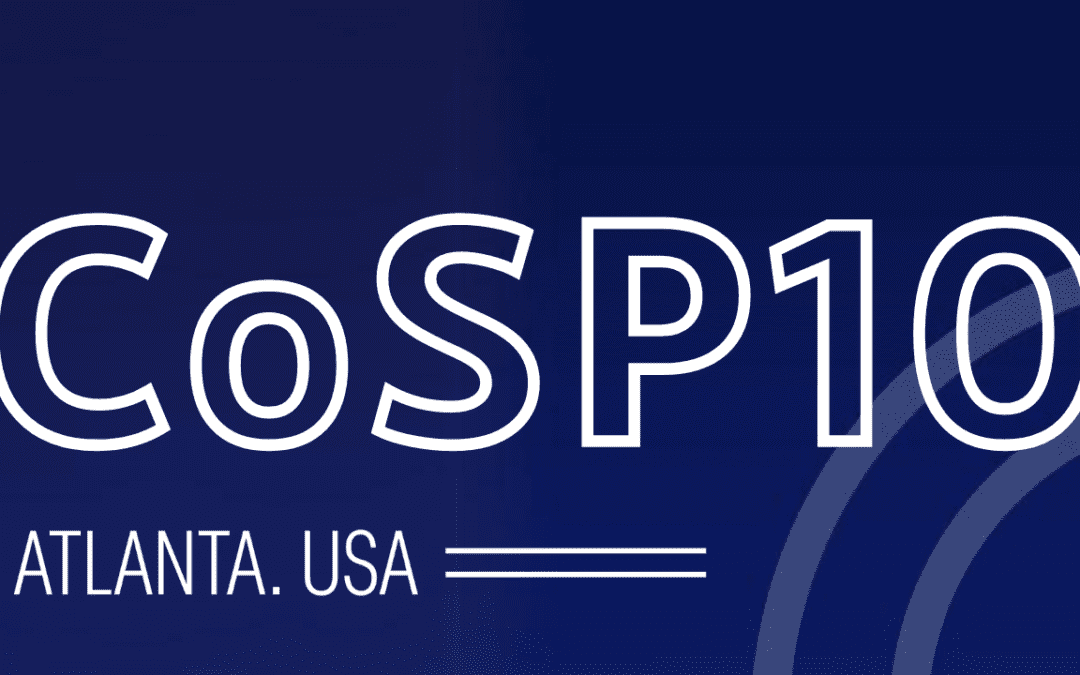
From Support to Governance: Global Anti-Corruption Pathways
Citizens for Global Solutions (CGS) and Integrity Initiatives International (III) co-hosted a Side Event to the Conference of States Parties to the International Anti-Corruption Convention (CoSP) on December 11, 2023. Cooperation among and assistance between States on investigative and prosecutorial strategies to combat corruption has advanced significantly. This side event will consider how lessons learned may be applied in global judicial terms: a standing and specialized International Anti-Corruption Court.
Co- Moderators
- Ian Lynch, Director, Integrity Initiatives International (III);
- Rebecca A. Shoot, Executive Director Citizens for Global Solutions
Speakers
- Judge Mark Wolf, Senior U.S. District Court Judge and Chair of Integrity Initiatives International;
- Judge Dr. Claudia Escobar, former Magistrate of the Court of Appeals of Guatemala and Vice Chair of Integrity Initiatives International;
- Prof. Fernando Adolfo Iglesias, Co-President, World Federalist Movement-Institute for Global Policy, Former Member of Chamber of Deputies of Argentina;
- Ms. Hillary Forden, Senior Associate Director, Rule of Law Program, The Carter Center;
- Justice Maria Wilson, Justice of Appeal of the Supreme Court of Trinidad and Tobago.
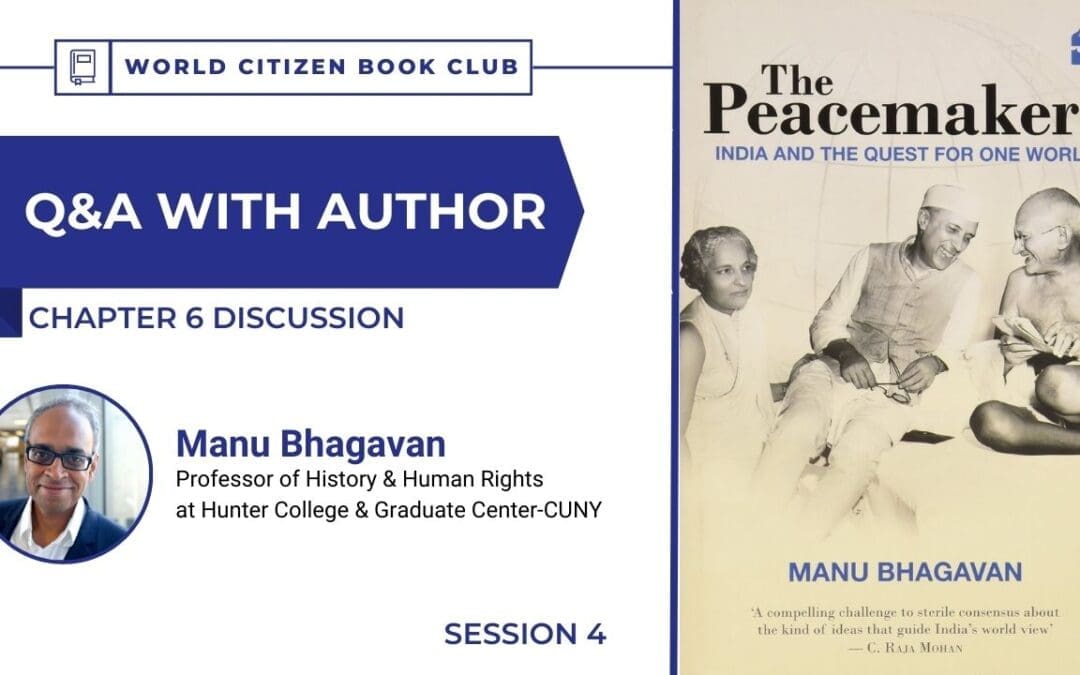
Book Club Session #4 | Peacemakers: India and the Quest for One World
Our forth and final session with author, Dr. Manu Bhagavan, focuses on Chapter 6.
Set against the backdrop of World War II, Indian independence and decolonization, and the Cold War, this “splendid…stunning…hugely engrossing” first-of-its-kind international history, based on seven years of research in twenty archives on three continents, tells the story of India’s quest to build consensus around the framework of “human rights,” to bridge the divisions between East and West, between capitalist and communist, and to create “one world” free of empire, poverty, exploitation, and war. This book is the story of India’s quest to create a common destiny for all people across the world based on the concept of human rights. In the years leading up to its independence from Great Britain, and more than a decade after, in a world torn asunder by unchecked colonial expansions and two world wars, Jawaharlal Nehru had a radical vision: bridging the ideological differences of the East and the West, healing the growing rift between capitalist and communist, and creating ‘One World’ that would be free of empire, exploitation and war. Madame Vijaya Lakshmi Pandit, Nehru’s sister, would lead the fight in and through the United Nations to turn all this into a reality. An electric orator and outstanding diplomat, she travelled across continents speaking in the voice of the oppressed and garnering support for her cause. The aim was to lay the foundation for global governance that would check uncontrolled state power, address the question of minorities and migrant peoples, and put an end to endemic poverty. Mahatma Gandhi’s legacy would go global.
Manu Bhagavan is Professor of History, Human Rights, and Public Policy at Hunter College and the Graduate Center-The City University of New York, where he is also Senior Fellow at the Ralph Bunche Institute for International Studies. He is author or editor of seven books, including the critically-acclaimed The Peacemakers (HarperCollins India 2012, Palgrave Macmillan 2013) and India and the Cold War (Penguin India and UNC Press, 2019). His newest book, forthcoming in December 2023 from Penguin/Viking India, is a biography of Madame Vijaya Lakshmi Pandit, one of the most important and celebrated women of the twentieth century. Manu is the recipient of a 2006 fellowship from the American Council of Learned Societies and more recently has received Hunter’s 2023 Presidential Award for Excellence in Scholarship. He has been interviewed for several documentaries and was featured in a skit on the Not the White House Correspondent’s Dinner, part of the satirical television program Full Frontal with Samantha Bee. In 2023, he also served as a judge for the PEN Literary Awards in the category of biography. Manu appears regularly in the media to discuss current affairs. Follow @ManuBhagavan on Twitter!
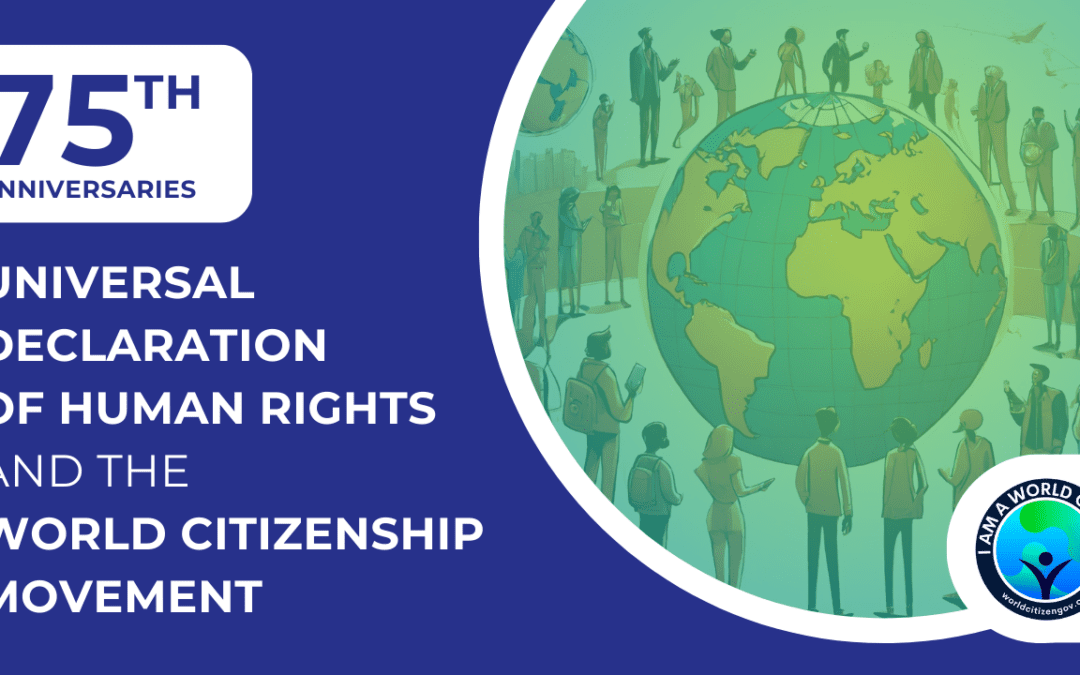
Time to Unite and Prosper: 75th Anniversaries of the Universal Declaration of Human Rights and the World Citizenship Movement
This year marks the 75th anniversary of the Universal Declaration of Human Rights (UDHR) and the World Citizenship Movement (WCM).
As a response to the devastation of World War II, the drafters of the UDHR sought to ensure that human rights would be protected by the rule of law. The Declaration provides a statement of our civil, cultural, economic, political, and social rights.
The WCM links our universal rights to our identity as citizens of the world. Former WWII bomber pilot Garry Davis gave up his US citizenship in favor of world citizenship, launching the World Citizenship Movement in 1948 to promote peace and human unity.
The UDHR and the WCM offer a framework of universal rights and universal identity to achieve the peaceful and governed world envisioned in 1948 by both the drafters of the UDHR and World Citizen Garry Davis.
Although we have enumerated our rights over the past 75 years, we have not yet fully implemented them. To paraphrase Rousseau from The Social Contract, humans are born free, but everywhere we are in chains. We have empowered a governing system — the nation-state — that because it is partial, can never fully affirm our rights and duties. The nation-state system where states maintain absolute sovereignty enslaves us to corporate interests and national security at the expense of human needs and world security.
As we celebrate how far humanity has come in the past seventy-five years, and simultaneously recognize the many existential challenges we currently face — war, climate destruction, injustice – let’s consider what kind of world we want for humanity in 2098, seventy-five years from now on the cusp of the 22nd Century.
Over the next 75 years, we must build a human rights institutional architecture that affirms our universal rights. That framework must be built on the global rule of law, world law that applies to everyone, everywhere. We must recognize the importance of seeing ourselves as world citizens and must legalize this status.
To achieve the peaceful and just world that the drafters of the UDHR and the advocates of the World Citizenship Movement envisioned, we must build the law, citizenship and governing structures at the world level that will help humans live together peacefully with each other and sustainably with the earth based on the principles of universal rights and universal citizenship.
How do we arrive at 2098, 75 years from now, having built a peaceful, just, sustainable, and united world?
- The UDHR must become a universal bill of human rights incorporated into a world constitution legally binding on everyone, everywhere. This would ensure that all governments, ranging from local town councils and nation-states to the world federal government would place rights above self-interest and the force of law above the law of force.
- World citizenship must become a recognized legal status for everyone, everywhere. This would mean that no one would be stateless anymore. Everyone would be able to exercise all rights no matter where they are or where they go throughout the world.
- We, humanity, must create a World Parliament to participate in governing the world as one united planet. This would put the rights of individuals above the power of states.
- A World Court of Universal Rights must be established where individuals and groups could seek redress when local judicial systems fail them. A global judicial system with subsidiary regional courts would provide venues for people to resolve conflicts peacefully.
- To secure our peacebuilding efforts, we must outlaw war and weapons manufacturing. We must use resources sustainably for peaceful means. Because war and its preparation are the biggest wasters of resources, we need to develop peace and indigenous-based economies that will protect the Earth and ensure humanity’s survival.
Ultimately, we must fulfill human needs, affirm rights, resolve conflict, and protect the environment. We must build an ethical identity and governing system that allows us to accomplish these human and planetary requirements and manage our human and environmental interactions equitably and peacefully.
In 1948, the UDHR and the World Citizenship Movement provided a vision of a united world as an alternative to absolute national sovereignty that perpetuates war and continues to fracture humanity. The UDHR and world citizenship together provide the ethical framework we need to have a thriving Earth community in 2098.
By fully implementing the Declaration of Human Rights and world citizenship, in 75 years from now, we will have transcended the “Divide and Conquer” approach in favor of a “Unite and Prosper” paradigm.
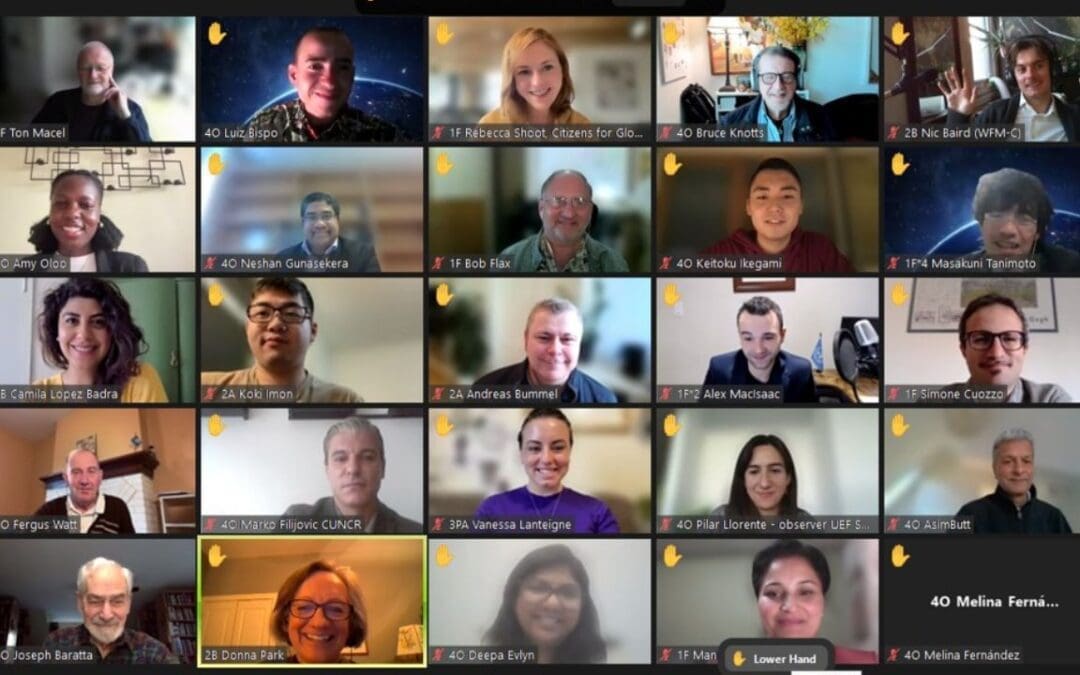
Better Global Governance urgently required to address our world’s critical issues
Press Release – November 16
CGS Board Chair, Executive Director, and Board Members participated in Recommendations from the 2023 Congress of the World Federalist Movement-Institute for Global Policy
Critical issues for humanity, such as the climate/environment crisis, a global erosion in human and civil rights, lack of progress on the United Nations Sustainable Development Goals (SDGs), and the rise of armed conflicts and authoritarian regimes, require better global governance according to member organizations of the World Federalist Movement – Institute for Global Policy (WFM-IGP). The organizations reaffirmed their shared commitment to advancing effective global governance on 11 and 12 November 2023 at the 29th WFM-IGP biennial Congress, attended by 70 delegates and observers from 29 countries.
“International law and global governance mechanisms must be strengthened in order to better manage the critical problems facing humanity,” explained WFM-IGP Congress Chair Donna Park, based in Cincinnati, Ohio, USA. She further observed: “World Federalism offers an effective model for a peaceful, secure, just, democratic, equitable and sustainable world. The policies and programs advanced over the weekend would help humanity build such a world.”
To advance international law, human rights and justice, the Congress resolved to support an international treaty to codify and provide accountability for Crimes Against Humanity and strengthen its recently launched Legal Alternatives to War (LAW not War) program to enhance the universality and effectiveness of the International Court of Justice. The Congress also resolved to continue its active support of the International Criminal Court (ICC) and promote the establishment of additional judicial institutions to meet global challenges not under ICC jurisdiction, including crimes against the environment, corruption, organized crime and persistent and unchecked violations of human rights, ensuring effective remedies for victims.
“The challenges we face today require global solutions, and world federalism provides the necessary framework for effective international cooperation,” says Rebecca A. Shoot, Co-Chair of the WFM-IGP Commission on International Justice, the Rule of Law and Human Rights, working out of Washington, DC, USA. “Respect for the rule of law, support for international judicial institutions, and protection of human rights must be the bedrock of this cooperation. By adopting concrete proposals to apply these principles in practice, WFM-IGP and its member and affiliated organizations take important steps to advance the vision and promise of the UN Charter for a world governed by law not war.”
To promote peace and human security, the Congress discussed common security approaches to address and resolve armed conflicts. In addition, the Congress called on States to phase out policies of nuclear deterrence; affirm the norm and practice of non-use of nuclear weapons; adopt policies of no-first-use of nuclear weapons; slash nuclear weapons budgets and re-allocate these resources to peace, climate protection and the SDGs; and commit to achieve the global elimination of nuclear weapons no later than 2045, the 100th anniversary of the UN. The Congress also advanced governance proposals to protect outer space for peaceful purposes and to ensure effective governance of Artificial Intelligence.
To enhance environmental and economic governance, the Congress supported the work of the Climate Governance Commission to help establish effective environmental governance mechanisms. Congress also affirmed the joint initiative of WFM, Citizens for Global Solutions and the Climate Governance Commission to launch the Mobilizing an Earth Governance Alliance (MEGA) Program to implement CGC 2023 report recommendations and complementary global environmental governance proposals, including pricing carbon, elaborating the concept of Earth Trusteeship, reforming the Bretton Woods institutions, and creating an empowered Global Environment Agency and UN Parliamentary Assembly.
“At root, it is not an environmental crisis,” says John Vlasto, WFM-IGP Executive Board Chair, based in London, UK. “Humanity has created a global governance crisis – resolve this and we can unite to live in harmony with each other and with nature.”
The Congress also explored a range of initiatives by WFM-IGP and its member and affiliated organizations to actuate these policies, including the Campaign for a UN Parliamentary Assembly, Campaign for a UN Emergency Peace Service, Common Security platform, Earth Trusteeship Initiative, Legal Alternatives to War (LAW not War) campaign, Move the Nuclear Weapons Money campaign, UNFOLD ZERO, 3+3 Coalition for a North-East Asia Nuclear Weapon Free Zone and 1 for 8 Billion project.
“The concrete proposals and exciting campaigns advanced by the World Federalist Movement provide feasible approaches to managing the world better,” says Alyn Ware, WFM-IGP Program Director, based in Prague, Czech Republic. “By strengthening current global governance mechanisms, we can resolve international conflicts more justly and humanely, prevent war and facilitate global cooperation to protect the environment and ensure a sustainable world for current and future generations.”
This Congress comes at a challenging time for humanity and our planet. Action to animate these words is more necessary than ever. “We have only one world and need to preserve it. For this, we need Parliament at the UN to address the democratic deficit at the UN, disastrous global climate crisis, prevent wars, bring regulations in the use of outer space and Artificial Intelligence,” stated Dr James Arputharaj, WFM-IGP Executive Board Member based in Bangalore, India.
To move more resolutely toward a world federation of nations, Congress urged commencing a process for a UN Charter Review Conference based on Article 109(3) of the Charter to strengthen the United Nations and establish a UN parliament. This process would recognize sovereignty of planetary citizens as co-decision makers alongside States, backed with universal and enforceable rule of law; replace the war system with peaceful conflict prevention and resolution; and honor the earth’s ecological boundaries.
Contact: Donna Park, WFM-IGP Congress Chair. Phone: +1 202 546 3950 Email: congress_chair@wfm-igp.org
*********************************************************************
About the World Federalist Movement- Institute for Global Policy
The World Federalist Movement/Institute for Global Policy, founded in 1947, is a non- profit, non-partisan civil society organization that promotes global governance to address peace and security, human rights, the environment and other transnational issues. The organization is governed by its Congress, comprised of 43 member organizations from across the globe that work to determine the broad policy direction of the organization. For inquiries, please contact Alyn Ware, Program Director at ware@wfm-igp.org.
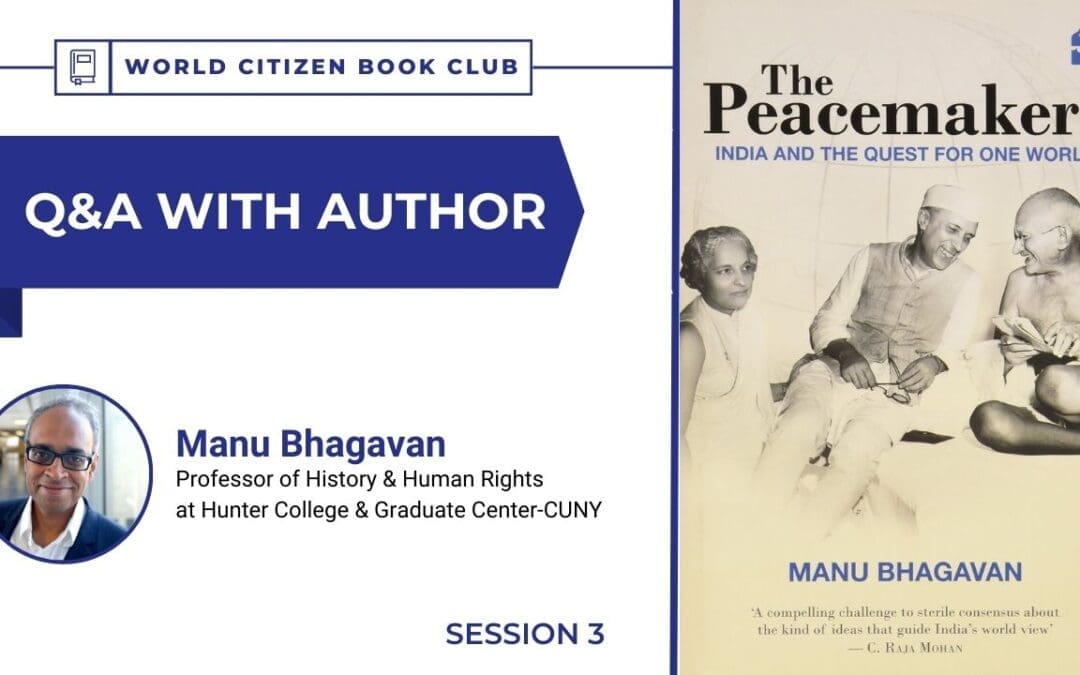
Book Club Session #3 | Peacemakers: India and the Quest for One World
Our third session with author, Dr. Manu Bhagavan, focuses on Chapter 5.
Set against the backdrop of World War II, Indian independence and decolonization, and the Cold War, this “splendid…stunning…hugely engrossing” first-of-its-kind international history, based on seven years of research in twenty archives on three continents, tells the story of India’s quest to build consensus around the framework of “human rights,” to bridge the divisions between East and West, between capitalist and communist, and to create “one world” free of empire, poverty, exploitation, and war. This book is the story of India’s quest to create a common destiny for all people across the world based on the concept of human rights. In the years leading up to its independence from Great Britain, and more than a decade after, in a world torn asunder by unchecked colonial expansions and two world wars, Jawaharlal Nehru had a radical vision: bridging the ideological differences of the East and the West, healing the growing rift between capitalist and communist, and creating ‘One World’ that would be free of empire, exploitation and war. Madame Vijaya Lakshmi Pandit, Nehru’s sister, would lead the fight in and through the United Nations to turn all this into a reality. An electric orator and outstanding diplomat, she travelled across continents speaking in the voice of the oppressed and garnering support for her cause. The aim was to lay the foundation for global governance that would check uncontrolled state power, address the question of minorities and migrant peoples, and put an end to endemic poverty. Mahatma Gandhi’s legacy would go global.
Manu Bhagavan is Professor of History, Human Rights, and Public Policy at Hunter College and the Graduate Center-The City University of New York, where he is also Senior Fellow at the Ralph Bunche Institute for International Studies. He is author or editor of seven books, including the critically-acclaimed The Peacemakers (HarperCollins India 2012, Palgrave Macmillan 2013) and India and the Cold War (Penguin India and UNC Press, 2019). His newest book, forthcoming in December 2023 from Penguin/Viking India, is a biography of Madame Vijaya Lakshmi Pandit, one of the most important and celebrated women of the twentieth century. Manu is the recipient of a 2006 fellowship from the American Council of Learned Societies and more recently has received Hunter’s 2023 Presidential Award for Excellence in Scholarship. He has been interviewed for several documentaries and was featured in a skit on the Not the White House Correspondent’s Dinner, part of the satirical television program Full Frontal with Samantha Bee. In 2023, he also served as a judge for the PEN Literary Awards in the category of biography. Manu appears regularly in the media to discuss current affairs. Follow @ManuBhagavan on Twitter!
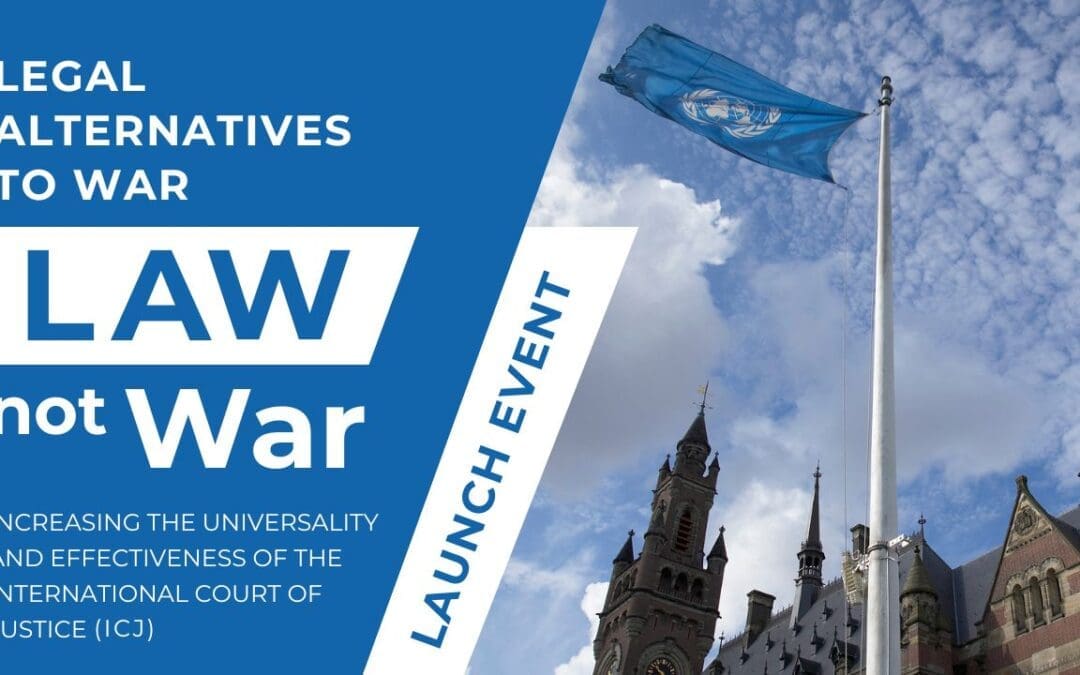
Legal Alternatives to War (LAW not War): Increasing the universality and effectiveness of the International Court of Justice
The launch event discusses and promotes the jurisdiction and use of the International Court of Justice (ICJ) as an important judicial mechanism to assist countries resolve international disputes peacefully rather than through recourse to the threat or use of force. The event follows-up from the presentation to the NPT Prep Com in August of the joint statement Common Security v Nuclear Disarmament: How to replace the current reliance on nuclear weapons with sustainable security for all (endorsed by 170 civil society organizations).
Legal Alternatives to War (LAW not War): Towards universal jurisdiction of the International Court of Justice, a new global campaign which aims to:
• Increase the number of States accepting the compulsory jurisdiction of the ICJ;
• Encourage more frequent use of the ICJ as a dispute resolution mechanism provided in international treaties;|
• Appeal to States to make use of ICJ jurisdiction through mutual agreement for specific disputes;
• Support UN bodies to request ICJ Advisory Opinions on critical issues;
• Encourage states to adopt constitutional amendments or legislative measures to affirm the UN Charter prohibition of war and the obligation to resolve international disputes peacefully including through recourse to the ICJ.
The campaign supports efforts of like-minded States to enhance the use of the International Court of Justice including the Handbook on accepting the jurisdiction of the International Court of Justice published by Switzerland, Netherlands, Uruguay, the United Kingdom, Lithuania, Japan and Botswana, and the Declaration on promoting the jurisdiction of the International Court of Justice released by Japan, Liechtenstein, Mexico, Netherlands, New Zealand, Norway, Poland, Romania, Spain and Switzerland in 2021 and now endorsed by 33 States.
Welcome
Tadashi Inuzuka
Co-President, World Federalist Movement- Institute for Global Policy. Former Senator from Nagasaki. Online
Moderators
Jutta Bertram Nothnagel
United Nations Representative, International Association of Lawyers Against Nuclear Arms. Vice-President of Lawyers Committee on Nuclear Policy and Focal Point on the International Criminal Court. In-person.
Alyn Ware
Program Director, World Federalist Movement-Institute for Global Policy. International Representative, Aotearoa Lawyers for Peace. In-person.
Presenters
Sir Kenneth Keith. Judge of the International Court of Justice (2006-2015). Emeritus Professor, Victoria University of Wellington Faculty of Law. Member of the New Zealand Court of Appeal (1995-2006) and NZ Supreme Court (2001,2003). Online.
H.E. Mr. Juan Manuel Gómez Robledo Verduzco
Deputy Permanent Representative of Mexico to the United Nations in New York. In-person. Member, International Law Commission (2012-2022). Agent for Mexico in the ICJ Avena case (Mexico v USA)
Prof. Dr. Bogdan AurescuMember, UN International Law Commission. Former Foreign Minister. Agent of Romania before the International Court of Justice (2004- 2009)
Rebecca Shoot
Executive Director, Citizens for Global Solutions. Co-Convener, Washington Working Group for the International Criminal Court. In-person.
Neshan Gunasekera, Research Fellow, Raoul Wallenberg Institute. Member, World Future Council. Former assistant to ICJ judge Christopher Weeramantry. Online.
Prof. Roger Clark, Board of Governors Professor Emeritus of Law, Rutgers Law School. Representative for Samoa in the 1996 ICJ case on the Legality of the Threat or Use of Nuclear Weapons, 1998 Rome negotiations for an International Criminal Court and subsequent ICC negotiations on the Crime of Aggression. In-person.
The campaign is being organized by a coalition of civil society organizations including Aotearoa Lawyers for Peace, Basel Peace Office, Citizens for Global Solutions, UNFOLD ZERO, World Federalist Movement-Institute for Global Policy (WFM-IGP) and the World Future Council – with more than 40 additional organizations supporting.
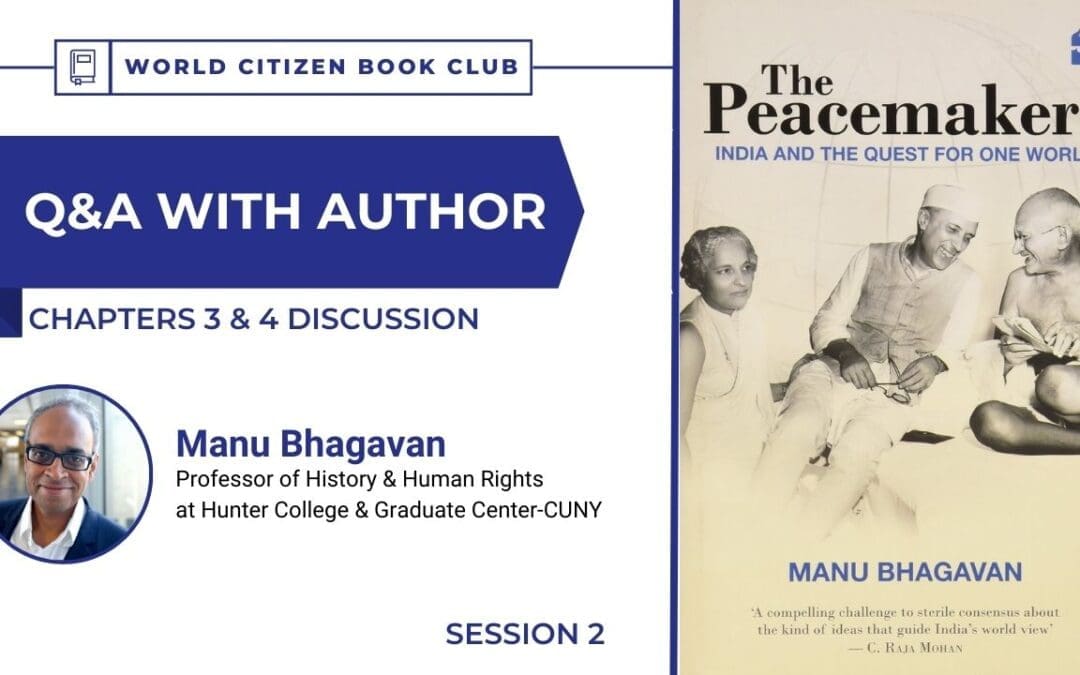
Book Club Session #2 | Peacemakers: India and the Quest for One World
Our second session with author, Dr. Manu Bhagavan, focuses on Chapters 3 & 4. Set against the backdrop of World War II, Indian independence and decolonization, and the Cold War, this “splendid…stunning…hugely engrossing” first-of-its-kind international history, based on seven years of research in twenty archives on three continents, tells the story of India’s quest to build consensus around the framework of “human rights,” to bridge the divisions between East and West, between capitalist and communist, and to create “one world” free of empire, poverty, exploitation, and war. This book is the story of India’s quest to create a common destiny for all people across the world based on the concept of human rights. In the years leading up to its independence from Great Britain, and more than a decade after, in a world torn asunder by unchecked colonial expansions and two world wars, Jawaharlal Nehru had a radical vision: bridging the ideological differences of the East and the West, healing the growing rift between capitalist and communist, and creating ‘One World’ that would be free of empire, exploitation and war. Madame Vijaya Lakshmi Pandit, Nehru’s sister, would lead the fight in and through the United Nations to turn all this into a reality. An electric orator and outstanding diplomat, she travelled across continents speaking in the voice of the oppressed and garnering support for her cause. The aim was to lay the foundation for global governance that would check uncontrolled state power, address the question of minorities and migrant peoples, and put an end to endemic poverty. Mahatma Gandhi’s legacy would go global.
Manu Bhagavan is Professor of History, Human Rights, and Public Policy at Hunter College and the Graduate Center-The City University of New York, where he is also Senior Fellow at the Ralph Bunche Institute for International Studies. He is author or editor of seven books, including the critically-acclaimed The Peacemakers (HarperCollins India 2012, Palgrave Macmillan 2013) and India and the Cold War (Penguin India and UNC Press, 2019). His newest book, forthcoming in December 2023 from Penguin/Viking India, is a biography of Madame Vijaya Lakshmi Pandit, one of the most important and celebrated women of the twentieth century. Manu is the recipient of a 2006 fellowship from the American Council of Learned Societies and more recently has received Hunter’s 2023 Presidential Award for Excellence in Scholarship.






























